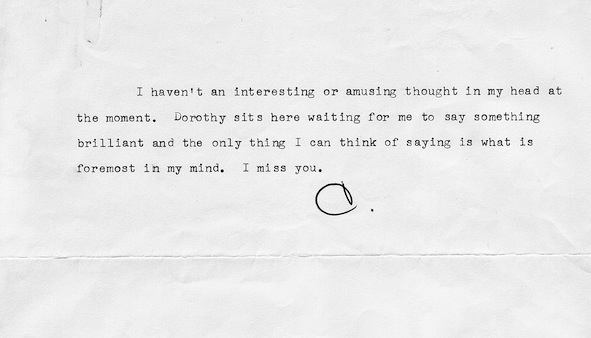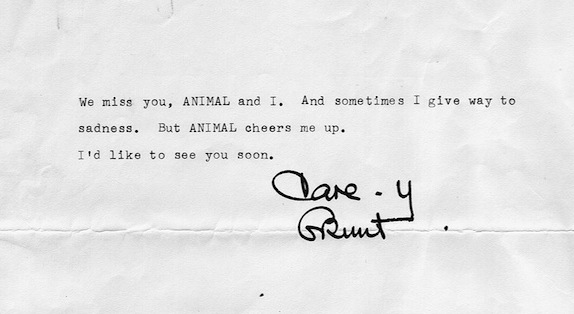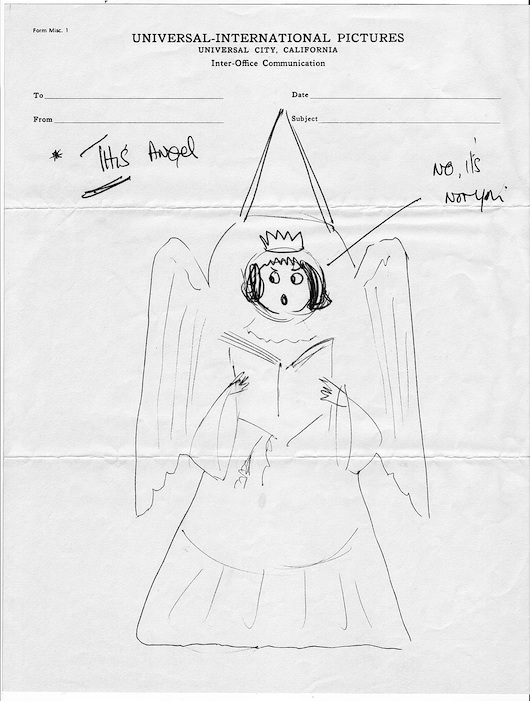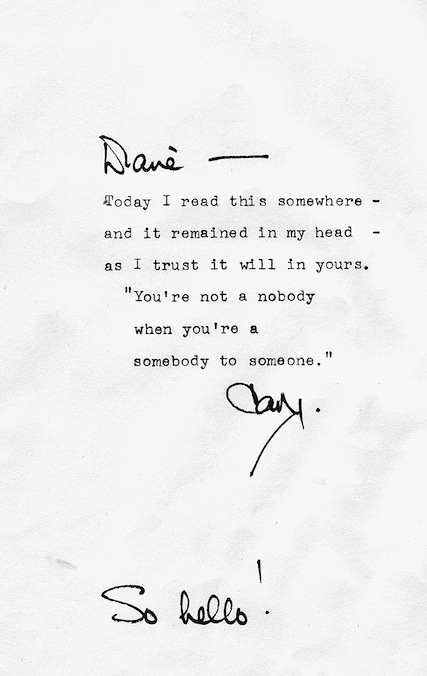Dear Cary: My Life With Cary Grant (13 page)
Read Dear Cary: My Life With Cary Grant Online
Authors: Dyan Cannon
Tags: #Biography & Autobiography, #Entertainment & Performing Arts, #Personal Memoirs, #Women, #Rich & Famous
“Good luck tonight, dear girl, though you won't need it,” he said as the driver put his luggage in the trunk. “Just relax and give it your best.
Your
best is the best of the best. You'll be great.”
That made my confidence swell, which was a good thing, because as the hour of our debut drew near, somebody opened Pandora's box. Theater people are fond of their superstitions, and to a certain extent I was one of them. The fact that I felt like a castaway by the time I got to the theater on opening night . . . it must have been a sign about the fate of our production.
I took the elevator down to the lobby and, when I looked outside, was surprised by the thunderstorm that had unleashed a torrential rain on the city. My room at the Wyndham had a view, but it was of a brick wall, so I had no idea what the weather was doing. I had the beautiful chiffon dress I was going to wear to Sardi's for the after-party draped over my arm.
Finding a cab in New York in the rainâforget it. I ran down the block to the Plaza Hotel and beggared my way along an endless line. “I'm starring in a Broadway show, and I'm late!” I cried. You couldn't really blame anyone for not buying it. I offered people theater tickets, which only enhanced their supposition that I was either lying or crazy. Finally, a middle-aged couple took pity on me and let me share their cab. They dropped me off a half block from the theater, and by the time I got to the stage entrance, I looked like I'd been dredged out of the Hudson and my chiffon dress looked like melted icing.
The house was packed; the response was . . . polite at best. Not even my dad could bring himself to suffer in silence. When the scene came in which Jane and I appeared in bikinisâthe producers had calculated that if all else failed,
flesh
would carry the dayâDad expressed his displeasure by unceremoniously leaving the audience.
After the show, we went to Sardi's and waited for the reviews. The critics wrote with rare vitriol and elegant savagery. You'd think every single member of the cast had personally insulted each of their mothers. We soldiered through the Sunday matinee, and then
The Fun Couple
was put out of its misery.
Maybe it was just in my nature to take it in stride, but fortunately I didn't take the play's failure as a personal defeat. I dusted myself off (I kept hearing Darlene shout, the day I fell off the horse, “Get back up! Now!”) and went out the very next day to audition for
How to Succeed in Business Without Really Trying.
They called me that evening to tell me I got the part. The show was already a Broadway hit, and now the producers were mounting a road company. I was cast in the female lead as Rosemary, the lovelorn secretary at the World Wide Wicket Company.
Long-Distance Love
I
gave Cary the good news when he called from Paris the next morning. He was happy for me until I told him we'd be on the road for a year.
“A year? That's a long time, Dyan.”
“I know. But you know how it is. I've got to earn a living.”
“I know you do. It's just that I'll miss you.”
“Maybe you'll visit me on the road.”
“Maybe I will. But in the meantime, maybe you'll visit me in Paris for the holidays.”
“Maybe I will!”
But first there were four weeks of rehearsal with musical numbers and choreography, then a break for Christmas before we hit the road. I was working with two Broadway giants, the writer-director Abe Burrows and the choreographer Bob Fosse, and after long days onstage we'd go out for dinner and stay up late talking. The atmosphere was creatively charged, and it brought me back to my days in Rome, sans Eduardo. I was having the time of my life.
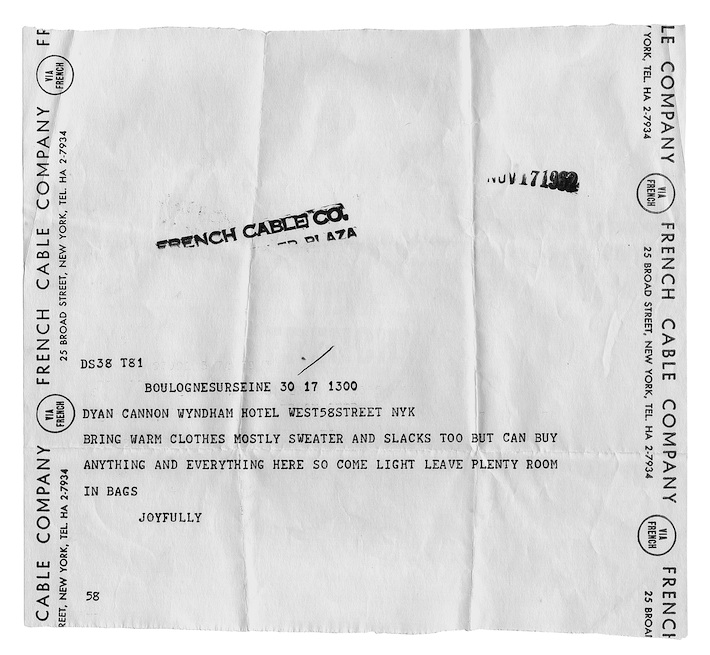
“H
e's wild about you, Dyan! Anyone who's around you both can tell.”
Audrey Hepburn smiled, took a tiny sip of champagne, and toasted me. It was New Year's Eve. I had joined Cary in Paris before Christmas, our first together. Audrey and I had clicked immediately and spent a lot of time together roaming the city, shopping, and chatting over coffee and
croque-monsieurs.
I adored her. I thought of her as the big sister I always wanted but never had. She was bighearted, warm, and maternal in every way. Now we were at the spacious house the studio had rented for Audrey and her husband, the actor Mel Ferrer, who had starred opposite her in
War and Peace
. They put on a spread worthy of a Russian czar. We started with shots of chilled vodka, then moved along to champagne. For dinner, there was a tin of beluga caviar the size of an oil drum, and the tiny, glistening beads were served on crisp potato skins as sheer as gossamer and dabbed with sour cream. The caviar was probably worth the gross national product of Portugal, but I could take it or leave itâthe potato skins and sour cream were the pièce de résistance to my taste.
After a midnight toast, I followed Audrey upstairs to the nursery, where we watched her son, Sean, while he slept.
“Having a child is the most wonderful thing in the world,” Audrey said. “Do you want children, Dyan?”
“A roomful,” I said.
“Cary?”
“I've been trying to smoke him out on the subject.”
“How's it going?”
“So far, there's no verdict.”
“He'll come around. Now that I've seen him with you, there's not a doubt in my mind. The man's in love.”
I hoped she was right.
T
he next day, New Year's Day, Cary and I lolled around in the big bed, watching TV and snacking until the housekeeper served us the traditional English holiday feast of roasted goose. We were relaxed, sipping wine and enjoying the crackling logs in the dining room fireplace, when Cary suddenly put down his fork and knife, looked at me, and said, “Dyan, you have made me an extraordinarily happy man. I know this is going to be the best year ever. Thank you.”
I was overcome. Making Cary happy was what I wanted more than anything. Making Cary happy made me happy.
He gazed at me for a few moments and said, “Are you sure you really want to go on the road?”
“What's the alternative?” I asked.
He sighed and went back to his dinner. I wanted to shake him.
January 4, the day before I went back to New York, was my birthday, but Cary was so busy that I didn't want to drop anything else on his plate, so I didn't say anything. It would've been the first birthday I'd celebrated with him, but there was really too much going on.
I left the next day, feeling a pang of longing for him before I even got on the plane. Parting was agonizing for both of us, and this good-bye was the worst yet. In a few days, I'd be on the road with the cast and crew of
How to Succeed
for a solid year, and we knew that we wouldn't be together very much in the months to come. We were both anxious about the separation. Had I made the wrong decision?
Cary sent a telegram the morning after I got to New York: “Silly Child! How is it that you are there and I am here? . . . and why didn't you tell me yesterday was your special day? Silly Child. Happy Birthday! Happy Birthday, Dear Beautiful Girl. You are missed. Love, Cary.”
T
he next week, we hit the road and I was doing what I felt I was born to do: acting, dancing, singing, and entertaining people. The road was a magical thing, but it could turn on you if you didn't take care of yourself. I loved the lights, the audiences, and the excitement, but even though I rarely had a moment to myself, it could be lonely. Having Bangs with me was a saving grace, but Bangs minus Cary . . . our family wasn't complete.
Cary must have sensed this because he churned out letters with fierce intensity, writing at least once a day, sometimes twice. He was still in France, where he was now shooting
Charade,
and I savored his letters, word by word. I wasn't as good about writing as Cary was, but he was understanding about it. “Don't worry about writing,” he said in one of his letters, “whether you do or notâdaily; if you do you do, if you don't you don't. It should not become a dutyâunless pleasurable. It's a joy for me because it fills the moments that I'm without your company.”
In his letters, his English stiff upper lip softened and he expressed many things that he kept hidden when I was with him: loneliness, sadness, wistfulness . . . illness, even.
Your notes keep me happier than I would otherwise feel. Thank you. The countryside all aroundâis snow coveredâicicle-hung and mysteriousâbut my rooms are warm and I must take advantage of this quietude, and day without filming, to write. I think of you throughout . . .
At this precise moment life is a dreary businessâI've been awake most of the nightâacheing (that's ACHEING) after days of fight scenes which will take at least a minute of film . . . And there's my aching heart too. In ten days only one letterâyour first from Cleveland on arrival there . . . yesterday when I arrived at the studio eager and certainâI couldn't believe the nothing that was before my eyes on the desk topâand then, still, none again at evening's delivery. It is early, nine a.m., and I am going to the studio to loopâthere must be a letterâI'm dispirited enough. Please undispirit me. Love C
DyanâIf I'm not writing much these days, it's not because you didn't cross my mind . . . for actually you don't CROSS my mind . . . you're THERE . . . IN it . . . So long!
YOU're THE girl.
Cary
A telegram from Rene, Cary's driver in France:
NO LETTER FROM YOU MR. GRANT WORRY PLEASE WRITE SOON
RENE.
Later, in another letter, while we were playing in Columbus, Ohio, he wrote: “I hope you like Columbusâhe discovered America. I discovered you. And you UNcovered me . . . and I'm not a bit cold. I like it I like it.”
M
y schedule made it hard for me to write consistently. Once Cary had gotten back to Los Angeles, I wrote notes in batches and sent them to Dorothy, Cary's secretary, and Helen, the maid, with instructions to place them strategically around the house: in the refrigerator, taped to the bathroom mirror, or on the TV set, even on his pillow. I wanted him to feel my presence, and he'd call overwhelmed with delight whenever he found one, which was just about daily.
There were always a lot of guys buzzing around the production. When you're in the spotlight, people project their fantasies onto you. Many men sent me flowers many nights, made backstage visits, and asked for dates. The attention was fun, but I always made it clear that I wasn't available. Cary was still my emotional center of gravity and that helped me stay focused amidst the flurry of dinner and party invitations.
Because of the time difference, it was hard for us to talk regularly while Cary was in France, but when he got back to L.A. to do post-production work, we talked nightly. During the week, the cast would usually stay out late after the show, but I frequently found myself heading back to the hotel for Cary's calls. I really looked forward to our talksâthey'd run two or three hours, and his long-distance bill must've been staggeringâbut sometimes I felt a little hemmed in. I did find myself having to reassure him that I wasn't about to have a fling with anyone. How could he possibly imagine that I would have an affair when he was my
all in all
? But then, I had flashes of insecurity about what
he
was up to without me around. But not for long.
On top of the calls, he continued to write. In one letter: “Thank you for going home each nightâfor the reassurance and confidence it gives meâfar beyond these words that cannot fully express my gratitude . . .”
“I haven't an interesting or amusing thought in my head at the moment,” he wrote in another letter. “[T]he only thing I can think of saying is what is foremost in my mind: I miss you.”
When Cary finished post-production on the film, he'd fly out on Friday afternoons to be with me wherever I wasâRochester, Cleveland, or Cincinnatiâand we'd spend the weekend snuggled up in the hotel room, relaxing and ordering room service.
